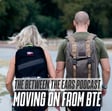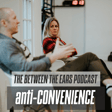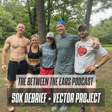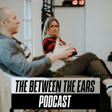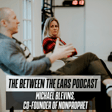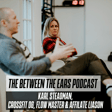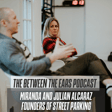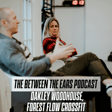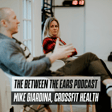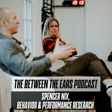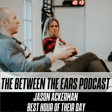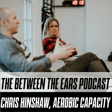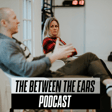Become a Creator today!Start creating today - Share your story with the world!
Start for free
00:00:00
00:00:01

Brian Combias: BTE Coach, Athlete, Student
Brian Combias is our first coach at BTE Fitness. Brian is an accomplished athlete and student of life whose authentic coaching style makes powerful connections with clients in pursuit of their physical, mental, and emotional fitness goals.
Brian is a natural fit for BTE and we dive into his story of where he comes from, how he got involved with BTE, and how he lives the ethos.
Transcript
Introduction and Setting the Scene
00:00:00
Speaker
Hello. Hello. That was smooth. I've been thinking about that. Hello for a while. I've heard the hello many times. I haven't been able to contribute to it though. Now you are. Now you have. Uh, Brian, welcome. Welcome to our home. I mean, you've been here before, beautiful home. Feel very comfortable. Thank you. This is like a fireside, fireside chat. I mean, we don't know the fire on cause it's gonna feel like it's 90 degrees, but
00:00:30
Speaker
It's a Sunday evening recording, which we don't normally do, which is kind of nice. Yeah, it is nice. We're not freezing in the gym office. It fits the mood, too. It does. The lights are down. Candles are lit. Very soothing.
Introducing Brian Kombias
00:00:48
Speaker
Welcome to the podcast. Thank you. Thanks for coming on. Brian Kombias. Riley. Riley's drinking my kombucha.
00:01:00
Speaker
Um, Brian, you're the first and only between the years employee. We're just going to, we're not going to spill any of the secrets. Yeah. I want it all to myself. Yes. Protect always hoard. Um, you've been coaching for a while for us now.
00:01:29
Speaker
Why don't you, would you mind just sharing about, a little bit about who you are, how you came here, where you're coming from? Sure, absolutely. My name is Brian Kombius. I grew up in Madison, New Jersey.
00:01:46
Speaker
Yeah, I come from having a very athletic background, grew up playing many sports and then focusing on some. And the journey to between the years was after reflecting on it, not physically motivated. It was very mentally and emotionally motivated. Okay.
00:02:16
Speaker
in high school as a soccer and lacrosse player. And I also would find it interesting to figure out a way to, you know, it's like there's the athlete, but then there's also the person. And I think for some time, I had
00:02:34
Speaker
person was the athlete. So who is the person without that? So in high school, I was a soccer and lacrosse player, but I grew up playing everything.
Brian's Early Relationship with Sports
00:02:48
Speaker
And more so because I love being outside. I love being active. It was probably
00:02:56
Speaker
unbeknownst to me at that time, my way of feeling in the zone. Because at that time, I didn't have the education knowledge of whether it be meditation or what resources or tools could I use to
00:03:14
Speaker
silence the outside. My father was a big athlete, lacrosse player, hockey player, tennis player. So really, I guess, looking back at my childhood, I didn't play football competitively, but I could throw football, kick football.
00:03:35
Speaker
I never swam competitively, but I could swim. But then there were all the racquet sports, all the hand-eye, the foot-eye, and then ended up focusing on soccer and lacrosse.
00:03:50
Speaker
pursued lacrosse at the collegiate level and took a twist my freshman year and pivoted, decided to play soccer. More so because when I decided not to play lacrosse, it wasn't like I'm choosing not to play lacrosse because I love playing soccer.
00:04:15
Speaker
It was just, what else do I know how to do? And I need to do something because when I didn't have what was an anchor for me for so long, there was a little bit of confusion. I wasn't stable.
00:04:35
Speaker
So then played soccer through the rest of college, also knowing that if I decided to do it and
Post-College Transition and Challenges
00:04:44
Speaker
put the time, the effort, and also, I don't know, there's a level of trust that you build with teammates and coaches and friends and family to
00:04:59
Speaker
be committed to it. I wasn't just going to do it. And then, oh, it's not working right now. Walk away again. Um, and then, uh, got out of college with a diploma, fortunately. Um, and then it was, you know, sports became recreate were recreation. How was that? How did that feel for it to go from identity competition, trust, commitment,
00:05:30
Speaker
to recreation. It was like snapping the fingers. When that soccer season was done my senior year of college, it was
00:05:44
Speaker
I was lost immediately. I didn't know, you hear it a lot from athletes. Who am I? What is my purpose? My performance in the gym or on the field was what gave me an identity.
00:06:07
Speaker
And so, you know, I had loving people around me. I have a loving family and loving friends where they all believe, you know, no, you are the same Brian that you always were. But for me, when I let go of that part of me, it was, you know, I didn't really have a North star.
00:06:33
Speaker
Um, I didn't have goals. I didn't have something to work hard for. And, uh, so I dabble a little bit with some sport after college, whether it be running or triathlons and all well and good. Um, did some short triathlons and, but at that time as a 21, 22 year old, I didn't know necessarily how to train intelligently how to
00:07:03
Speaker
nutrition, sleep, also trying to manage it with working in the real world for the very first time. And then for that first year out of college, doing the commute from being out in the suburbs into New York. So they're trying to figure out life, which
00:07:28
Speaker
is kind of a rude awakening. You enter the world of responsibility to yourself, to the people around you, and to being a good person. And so I battled some injuries just because of
00:07:48
Speaker
you know, doing what I was doing was not working. And that sidelined me for a little while, you know, from not being able to run.
Finding Community in CrossFit
00:07:59
Speaker
And then, I don't know, when things are taken away from you, you start to
00:08:05
Speaker
have an appreciation and you also learn new things. So it's almost like through discomfort, you find comfort.
00:08:20
Speaker
I had been doing a lot of running a lot of endurance and then i wanted to get stronger and i was living in hobo can at the time i live with a roommate that i had gone to college with we were on the soccer team together and. There was a i felt a shift in my personal being it was.
00:08:44
Speaker
I wasn't necessarily, I didn't have the desire to go into the city on a Friday night and a Saturday night and then Sunday for brunch.
00:08:55
Speaker
So in a way, I felt a little isolated. I didn't find my tribe yet. And also being in a place that I didn't know a lot of people who lived in Hoboken. A lot of my friends lived in New York or Connecticut. And that was when I first walked into CrossFit Hoboken.
00:09:24
Speaker
The feeling was, oh, there are people that want to wake up on a Saturday morning and like.
00:09:30
Speaker
run or do something active. This is really cool. And then friendships were formed, and then there was community. And then get a little taste of what it was almost like to be on a team again. And so you dive in to that. And I pursued that for a little while, always as hobby.
00:09:57
Speaker
And I think up until, well, maybe still the thought of, Oh, maybe I can be an athlete in something else. You know, if it's, if it's not soccer or lacrosse, maybe it's, maybe it's triathlons. Maybe it's CrossFit. Maybe it's running really far.
Sacrifices in Athletic Pursuits
00:10:17
Speaker
Maybe it's biking. So you never bit on that. I never bit on that.
00:10:23
Speaker
And I think I'm still trying to figure out the reason why. And something that I think about that the three of us have talked about before, it's to perform at that level.
00:10:42
Speaker
you have to have a willingness to sacrifice something. And it was almost like making the decision in high school, whether or not to play division one or division three. And I guess innately within me, I wasn't willing to sacrifice all the things that came with being a super high performer.
00:11:12
Speaker
I, thankfully, was able to rely a lot on athleticism when I was an athlete, or still am an athlete. But there are skill sets that
00:11:27
Speaker
that you have to train and learn and spend the time doing. And I think maybe that's a little bit of what helped me from really going all the way. A little bit of that, maybe a little bit of...
00:11:43
Speaker
external influence, just, hey, you know, you see a lot of athletes now, young athletes out of school and they drop things, they move and live in a house with nine of their friends and eat, sleep and breathe, whatever they're doing all day, every day with the thought of, you know,
00:12:08
Speaker
I'm not, not that real life doesn't exist, but that this is all, this is what I'll do. Yeah. I mean, you're like, not to be reductionist, but like you're playing a game. Tom Brady is playing a game. Now I get it to them. I don't get it because I'm not them, but like, yes, it's a livelihood. It's a this, it's a that, but like, it's a game.
00:12:37
Speaker
And the, what you're saying rings really true too. And my senior year of college, I made the decision not to go pursue the MLS because I was not 100% willing to go there. I was like 90%. And I made a deal with myself. It was all or nothing. And I'm not doing this like dabble.
00:13:07
Speaker
body was through a ringer and to get to the next level to thrive there. Yeah, it's, it is 100%. You were sacrificing everything else. And then you, a lot of times like, yep, you get a room, you get a house, you go to this, you go to that to scrape together enough to buy some ramen. Maybe you work a couple of camps and then you
00:13:33
Speaker
somebody comes high above the ball, tip fib fracture, you're probably done. You know, unless you're obviously at the superstar level, which, you know, I certainly wasn't, um, could have, you know, whatever, but you didn't have norm tech boots, like my closet, policy on my legs, like Beckham, but you know, it's that thing it's, you know, what are you willing to sacrifice? That's the, that's the litmus test for, are you training?
00:14:04
Speaker
And I think, whatever, I don't care. Real athletes get that. Real athletes get that because they've lived it and they've sacrificed perhaps their childhood in some ways, not everybody, but in some ways. What are you going to say? Okay. No, I was just going to say, I think living, like if you're not a hundred percent in, then it's this weird unhealthy distraction, like delusional world. If you're going to be like,
00:14:33
Speaker
You know, I think there's a healthy amount of like, yeah, do triathlon or do CrossFit as a recreational athlete. Like, or there's like the CrossFit games where it's like your livelihood. The in-between is kind of a delusional space. It really is. And so it's like, you're not, you're, you're not an either. You're just kind of, what are you, what are you doing?
00:14:55
Speaker
Yeah, there's, uh, there's like the intersection between your willingness and like your wanting of something, you know, it's, Hey, I like, yeah, I w I want that. Right. But are you like, are you willing to do what you can to really get that's a great point. Imagine if ever imagine if we cleaned up our language.
00:15:23
Speaker
to just really kinda say like, no, I just really want something.
00:15:29
Speaker
And. And that's OK if you don't get it. Yeah, yeah, yeah. To share that you want it. So I just want it, you know, versus versus. Right. Because it's clarifying that like you might not be willing. There's a lot of things you want, but then when you look at what stands between you and them. And we've talked about that recently with some things like, OK, like it's easy to look at other people and say, I want what they have. But OK, look at everything they did to get there. Like, is that also what you want? Because.
00:15:58
Speaker
That's what it sounds like. And wanting, that's a desire. Willingness is a behavior. That's like willingness is not an answer or anything like this. It's a behavior. And most people want things, but they're unwilling to do
00:16:26
Speaker
what it takes to maybe get it. So you were dabbling in CrossFit at that time. And again, to clarify, strictly recreational. Yes. And then obviously, at some point, our paths crossed when you came to Morristown.
00:16:50
Speaker
Yeah, and that was also after an interesting period of a few years. I had maybe started weaning away from CrossFit, not because
00:17:04
Speaker
I thought it was bad or it didn't serve. It wasn't any of that, but it wasn't serving what I needed at the particular time. So that was over the years of maybe when I was 26, 27, 28, and I was trying to figure out my way again. It's the wave.
00:17:29
Speaker
You feel like you got it figured out, and then it's swept away, and then you're back to doing it all over again. And so it was a mixture of, OK, am I going to a conventional gym? Am I going to run doing things by myself?
00:17:49
Speaker
I had worked my way out towards Morristown around the time of COVID because my family spends, or my parents are in Florida a majority of the time now, and I thought to myself, it'll be a lot nicer to stay in a house during COVID than it would be to stay in my one-bedroom apartment.
00:18:10
Speaker
And so I came out and then shortly after ended up moving into Morristown. And that's when we first crossed paths. That was before COVID though, right? Right before we had met a few months before COVID, I had started coaching at Motown. And oh gosh, you know what, maybe
00:18:36
Speaker
Yeah, I was going to say that you started before COVID. I started before COVID, but didn't
Brian's Coaching Journey
00:18:41
Speaker
officially. Yeah, you didn't coach anything. That's right. You had like just come on, but then it was like this, the longest, the longest road to your first class ever. Yes. And so a lot of people think first met me on, on zoom. Yeah. Yeah. When you rolled that out. Yeah. Amazingly. 10 hours after COVID hit.
00:19:03
Speaker
Um, yeah, that was, uh, yeah. Anyway, and I think very similar to how it feels now, you know, our, our, our first interaction at the gym was very comfortable. Uh, just the three of us sitting at the office. No, no one was, there was no class. There was no night. And, uh, it was, it was very personal. And, uh, and then shortly after I was coaching there for a little while and.
00:19:35
Speaker
still then figuring out, you know, where was it that I wanted to be? What was it that fed me? What was it that drew you to coaching in the first place? Like what made you want to be on that side?
00:19:49
Speaker
almost similar to the, do you want to be an athlete? Did you ever take the steps to get to that point? I had always dabbled with the idea of wanting to coach. I appreciate and I love coming from a place of teaching.
00:20:10
Speaker
Um, my brother and I taught tennis when we were growing up. Um, I had done some camps. I, when I was 16, 17 years old, I created my own sports, you know, sports business where I would go and like literally go to people like little kids houses, coach them in soccer. And yeah.
00:20:32
Speaker
throw the balls in my car and so And then when I was at Hoboken I had started the coaches development program But a few weeks into that I felt like it was taking away from my experience sure yeah, and I need and like and and it was that experience of sport that I really needed at that time right as like a
00:21:01
Speaker
Stabilizer. Yeah. And then so, then when the opportunity arose again, I think you had... Yeah, we posted something, I think. Yeah. We posted it. It was funny because when we did meet with you... Well, and because we didn't really know you, we sat... Well, it was the first time I ever met him.
00:21:23
Speaker
Right. And we sat in the office and it was like an interview. It was outside of the office. I remember that. No, no, no. The first time was inside the office for like an official interview. Yeah. And we left and we're like, well, obviously, like obviously yes. Like we would like for, for Brian to be here. And then the second time after we like,
00:21:43
Speaker
sat and like chatted because you were, I think interested in like, well, what's the between the ears stuff? Um, and we kind of were like, yeah. Um, yeah, we left that where like, he definitely he's nothing against Morristown and what we'd do there. But we felt like the fit was definitely going in the direction of like, I think he would be really interested in the other stuff we're doing. Yeah. And that was before.
00:22:10
Speaker
But that was before between years. Yeah. So the gym didn't exist, but we knew you would be a fit for it. Cause yeah, that was cool. So, and then we opened the gym and you open the gym and, and I almost distinctly remember, uh, like point in time that the changeover happened.
Personal Growth at Between the Ears
00:22:36
Speaker
Um,
00:22:39
Speaker
I was coaching, but still felt a little bit lost in what it was that I was pursuing. What was it in wellness and fitness that I wanted for myself? I still played some stuff competitively, but I still did not satisfy the feeling that I was looking for when I was, unfortunately, when I was
00:23:04
Speaker
20 years old. It's like, well, I'm not 20 years old anymore, but I really still want that. And we had a seminar at Motown, spacing on the name of StrongFit. Oh, yeah, StrongFit. That's right. StrongFit.
00:23:30
Speaker
Both of you were there, and it was on the Saturday where we were doing sleds, sled pushing. And that stood up a lot of uncomfortable emotions for me. And not uncomfortable in that, oh, my legs are sore.
00:23:54
Speaker
But like there was a discomfort that I had like with myself. And I felt like it was almost as if you were looking up to the sky and you saw a glass ceiling. And that I so badly wanted the things on the other side of that glass ceiling.
00:24:17
Speaker
I don't know. Was I unwilling to break through? Did I not have the tools to break through? And so it was just, there I was, paralyzed, just looking, staring. And on one of the sled pushes, I had gone down to the far side of the gym and Bill was standing there and the gym got really quiet for a moment and
00:24:45
Speaker
You didn't say a lot to me. No, but it was almost just it. But what you did say to me was you're the one making the decision of whether or not you're going to do this. It's like, and then when you do make that decision, commit step in and there was
00:25:10
Speaker
that opened up a dimension of me feeling like I needed to do the hard work of something that was
00:25:23
Speaker
in my head and in my heart, not in my muscles. I was my own worst enemy. I was preventing myself from doing things. And what were those things that were preventing me? Was it fear? Was it pain?
00:25:47
Speaker
I don't know, something outside of myself, within myself. And lack of skill, lack of know-how, maybe. Yeah. And I think that I'd always...
00:26:02
Speaker
I always had looked highly upon both of you and what it is that you have done, created your education in all the things that we do. And I sat back and I was just like, I want to learn from them. And then enter BTE being create like the brick and mortar being created as well as the online. And there was a.
00:26:33
Speaker
I feel like these two people see me and I need to put myself in that environment to see if I'm able to succeed in battling whatever it was that I thought that I was battling at the point.
00:26:54
Speaker
And so then came the year of, you know, before coaching with you, I trained with you for a year. Yeah. And that's something that, you know, just recognizing how people are different and not bad or good or wrong or whatever. But we, one of the things that resonates with us is
00:27:20
Speaker
We're very much of that same, if we experience something and we think like, I could learn from this, or this could be valuable, or this connects and resonates with me, we pursue it. Strong fit, him going out to the seminar he did.
00:27:40
Speaker
way back when I would drive an hour to go to the only CrossFit gym, do a 20 minute workout, drive an hour back in traffic. And so that was such a, we connected on that. That was something that meant a lot, putting yourself. And I think there's so many things that get in the way for people.
00:28:01
Speaker
That's like, I got to drive. That's a little less convenient. I don't know. What is that about? Convenience. But you didn't let that get in the way and you just immersed yourself. Like I know there's something here. Go, go find out. Oh, and that's, and we were maybe talking, we were talking about it 30 minutes ago about there being something there. There's, there's something that we believe and there is a, an untapped frontier.
00:28:32
Speaker
And we don't have the X plus Y equals Z, but there's also an acceptance of that. I think that we've adopted and that's allowing us to touch many people.
00:28:53
Speaker
We have spoken about the psychedelics, obviously, on this podcast before. And that word, inefficable, unable to articulate it. There's not words. That's very much when Bill's describing his experience or people describe that world. It's inefficable. And it's very similar to what we're doing. It's not something you can just, the elevator pitch that makes us insane when people are like, well, the answer to your marketing problems is the elevator pitch. It's like, how do you surmise this
00:29:24
Speaker
Like there isn't one. And if, if that's the linchpin to someone, they only got 10 seconds, then they're probably not, that's probably not for them. Um, so yeah. So your experience there, what? Training. Yeah. Training. What was that like? It was a very, it was a different style of, of training. Um,
00:29:51
Speaker
But I think the biggest switchover was more like the self-evaluation, like the assessing of yourself prior to doing anything, to
00:30:07
Speaker
meeting and accepting myself where I was at in that particular day, there may have been, there may have been three or four days in a row that I came to the gym and Kate was coaching. And it was just like, you just need to show up because I have a tendency to
00:30:29
Speaker
be a master projector. I create the environment. I create the feeling. If there's a game, you almost self-visualize. How would I act in this situation? What would I do if the ball came here or if I missed the pass here? Similar to going to the gym.
00:30:55
Speaker
I was, oh, if we're going to do some lower body back squatting today, the thought is, what's that going to feel like? Probably not going to feel very good. And then once I tell myself it's not going to feel very good, then I don't really want to do it. Right. And then when I'm thinking about not wanting to do it,
00:31:18
Speaker
It's how does that conflict against my desire to want to have done it in the first place. And then we go to my favorite place or what has been my favorite place for a long time that I think that both have given me tools to help me get out of is that moment of paralysis of inaction. Um, and so.
00:31:46
Speaker
The first six months maybe was more, it was just learning how to honor myself. And that was hard because it was almost as if everything that told me that I was honoring myself meant that I wasn't doing what I had
00:32:12
Speaker
Intellectually, it projected what it wanted to do. It's like, I want to be strong. I want to be fast. I want to be mentally like no one can break me. I was like, I couldn't have any of those things because I didn't even know how to listen to myself. Isn't that amazing? That's one of the things like when you said even about the sled or that it's really hard when
00:32:40
Speaker
someone gives you the decision. That's where, and it's not always wrong, but so much of fitness is just show up, we'll tell you what to do. And people just tell me what to do. But that all the time,
00:33:00
Speaker
You know, I mean, you're not getting to choose. Do I want to back squat? Do I want to do something? Like you're, you're taking away that process. And I think when people first meet that process, worst, you know, it's still challenging. There's still days where you're like, I don't know. And it really forces you to have to, you know, stop. And, and sometimes there's like, I just don't want to do that. I don't want to stop. I don't want to think, I don't want to see how I'm feeling.
00:33:27
Speaker
And there's a resistance to that, but it's so valuable if you can, but you have to be able to be given that opportunity first. And I do remember you would spend some time, it would take a little time, but what's cool about that is then they were like, okay, what are the things for you that are necessary?
00:33:45
Speaker
All right, let's just get on the bike and start moving. It doesn't mean like, well, whatever, you're just going to push that sled. It doesn't matter how you feel. It's just like, okay, but what would be one step towards getting the body going and feeling what you're feeling and being able to navigate? Well, okay, let's just move a little bit and then kind of going from there. But it was cool to see your process. Yeah. A little forward momentum. Um, and also a lot of,
00:34:15
Speaker
reflection after. It was going into a session wanting it to be a particular way, realizing that it couldn't be a particular way and that I had to pivot and do something different that aligned more with what I was feeling and with what I was wanting. And then after understanding and realizing, recognizing that
00:34:49
Speaker
I'm still okay and maybe I'm even better than I was when I came in. How could that be? How could that be that I came in and I didn't using physical fitness as the example? How could it be that I came in and I wasn't lying on the floor in a pool of sweat, not able to catch my breath? If I'm not like that, how did I get better?
00:35:20
Speaker
Yeah. You start to learn how to treat yourself differently and actually broaden your experiences. The lying on the floor in a pool of sweat is an experience. It has a time and a place. It does.
00:35:42
Speaker
but it's just an experience, but broadening our experiences, you know, walking away from a workout, knowing you identified, sought and accomplished a win. That was not that, you know, that you learned to be flexible, not labile and realize, wow, I can be flexible and I can be okay versus just, you know, this,
00:36:08
Speaker
changing every bit which way. Cause that's not the thing, you know, it's not, don't be a windsock. But let me ask you your ability to push yourself to work,
Balancing Effort and Recovery in Training
00:36:25
Speaker
to get to that point where you're on the floor, sweat, maybe not even in your body anymore. Who knows?
00:36:34
Speaker
How has that gone? Have you lost it? Have you improved it? Has it stayed the same? What's that capacity been like? Certainly improved. And I think my capacity to experience it is tenfold.
00:36:58
Speaker
But with that, I also understand what going there means. And you have to ask yourself those questions before you do that. And so, like you said, there is a time and there is a place and it's not every day. Right. It's kind of crazy to look at that now and think, God, it's not even possible every day.
00:37:24
Speaker
But that's the one thing I think that there's a fear initially of like, if I don't do that every day, am I going to lose it? Exactly. But the reality of stepping back and broadening that scope, the reality is you actually get better at it, more purposeful, more aggressive, because you're choosing it. And also physiologically, you're gaining so much more in your body to be able to perform, so to speak. But yeah, that's really awesome.
00:37:54
Speaker
choosing that word. That word stuck from the very beginning and that was choosing agency. I didn't necessarily know what that meant in the realm of how it related to my life and then it became very clear that I
00:38:20
Speaker
recognize that I felt like I didn't have a lot of agency. And that I was very good at doing what was needed, what was expected, but not necessarily what came from within me. And then the power of what can happen when you choose yourself.
00:38:49
Speaker
And that has carried over into every aspect of life. I mean, that's not in the gym. That's in your personal relationships, your family, your workplace. Yeah. And this is the most amateur operation. Yeah. And that's the thing that
00:39:22
Speaker
It's amazing how much of a hesitation and a trepidation there is when it's like, hey, give people the option to choose. It's like, well, people are just going to choose the easy route. They're going to choose what they're good at. They're going to choose what they want to do, not what they should do or what they need to do or blah, blah, blah, right? This whole thing.
00:39:51
Speaker
And that was a thing that we actually experienced. We were the first affiliate without a doubt in this area, but I would also say like, I don't know, we never saw it happen before. And Kariana obviously has seen thousands of like, you know, we put the workouts up in advance for the week.
00:40:15
Speaker
Well, right. That was because that was a, that was like a, you don't do that kind of thing. You don't do that. You put the workout cross it.com puts the workouts up because people will avoid them 8 PM the night before. And that's kind of what you do. And that was awesome. That's cool. Like I like it. But then it's like,
00:40:30
Speaker
You know, we were always kind of thinking and thinking this is, you know, this, however many years ago, this was now eat, but it's like, this doesn't necessarily make sense from the individual's experience. I get it from the dogmatic experience and the, and the belief that if people know what's ahead of them, they're going to cherry pick. That's the way that's like, that's the propaganda.
00:41:00
Speaker
Then on the other side, it's like, put yourself in their shoes and look at their experience. And wouldn't it be like these people aren't training to go to the games. They're not sacrificing anything. Nobody's sacrificing anything in like the normal daily CrossFit athlete, gym goer. Like there's not a sacrifice and that's great. That's wonderful. It's recreation, like beautiful, but like,
00:41:29
Speaker
If they're going to come every Tuesday and Thursday or Monday, Wednesday, Friday, that's just why do you come here? Because that's when it fits my schedule. Oh, okay. And then we present an option and say, Hey, I know you go every Monday, Wednesday, Friday, but like what happens if Monday, Wednesday and Friday, like it's kind of the same thing all the time. Cause you know, you do the thing and there's all of these considerations.
00:41:51
Speaker
But it's amazing. It's eye opening to me, to us when it's like, so the giving someone the ability to choose, giving them the option is met with this negative view of what they'll do. So your view of people is that negative.
00:42:11
Speaker
that they're going to do what they don't want to do. They're going to cherry pick. They're going to do this. You have to control. You have to control them. Yeah. You have to control the environmental so that they choose right. Yeah. You have to force them into doing this because if they don't do it because something within them,
00:42:32
Speaker
says, ah, just not today. Fuck you. Do it anyway. Be hard, blah, blah, blah. Right.
The Structure of CrossFit Programming
00:42:40
Speaker
And we wonder why people don't trust themselves. Yeah. I mean, you know, one of the things that's come up, I don't know, like, and we were talking about it cause we had that, we had a session yesterday, the Saturday session, it was a team thing and the team and partner situation is a great example of that.
00:43:02
Speaker
Like in, um, many, most people at a CrossFit gym have anxiety about the team. We did team week. Yeah. People will just not come because, and it's like, well, that's, you know, no common. It's like, that could be one of the, that could be like legitimately traumatic for someone and you're forcing them into this thing. And it's like, that was one of those. It's like, it's not about the workouts.
00:43:29
Speaker
But that is one of those, it's not even about fitness. I mean, sure, I don't wanna be the weaker one, I don't wanna be slow, but this is about something totally different, but we're gonna make you do this. And it's like, I don't know about that.
00:43:44
Speaker
you know, but that same notion that like you have to, you just said agency and choice and those are huge between the ears and to that, to that end, like it's, it is so powerful and there are ways to do that in other gyms, not just between the ears, but it needs, it really is like valuable. Yeah. I mean, you look at that and you say, okay, so we're going to, we're going to put the power in your hands.
00:44:16
Speaker
Any guide, any coach, teacher, the leader, their job is hopefully done when they work themselves out of a job, when they empower people to not just do, but to understand.
00:44:37
Speaker
And that, that is such a huge, huge part. Sometimes yes. Sometimes like just, just, just tell me what to do. Got it. Of course. And it's not to say that it always has to be custom curate something based on that. We're so out of balance farming things out to others.
00:45:05
Speaker
that people, we see it all the time. And the gym is a tapestry, is a frigging Petri dish for life. And we see that with people where, you know, yeah, this group yesterday, you know, we're going, what would a wind be? And it's like, it was as if we were to say, and these are good people, these are professionals.
00:45:31
Speaker
like what's the chemical composition of something and you're like, um, yeah, it was really tough. Yeah. And it's like, why is it so hard? It's like, well, just cause it's just untrained no different than treating yourself perhaps differently the first six months of your
00:45:53
Speaker
you know, being a member of between the years. What was that about? That was about learning how to treat yourself differently. Right. That's what it was about. And that's the foundation. And that can be tough. That can be hard. That can, you know, that's not an easy thing. It sounds great. The end result or the building you construct upon that foundation might look beautiful, but that fucking foundation takes some work. Oh yeah.
00:46:21
Speaker
So to transition into coaching, then what transpired? And was it a different, like how was that different than the first go, you know, transitioning into between the years coaching?
00:46:35
Speaker
Right. And also before going to that, to add that what's difficult is that we live in a world that those things are always perpetuating. What is the quick fix? I mean, you even see it how
00:46:54
Speaker
Some social media platforms have reconstructed how they display things. There you go from videos to now these shorts, you know, on YouTube and Instagram and TikTok. And it's quick. People want to know. I want to know everything right now when I want it.
00:47:10
Speaker
There is no settling in. There is no being okay with not knowing. That's, I think, how many people approach coming to a gym. It's, hey, my goal is this.
00:47:30
Speaker
what are you going to do to get me there in four weeks? You're like, well, it's a little more than just nothing, you know? Um, so yeah. Um, and then, okay. So for coaching,
00:47:45
Speaker
Then the transition over to Coaching at BTE was a really good fit for me. I loved Coaching at Motown. I loved the people there. That was awesome. And still is. And I do need to make a point to go back.
00:48:08
Speaker
I know that I may work better in a more intimate one-on-one semi-private environment where I'm like, I want to be all about you. Tell me what you feel.
00:48:30
Speaker
Tell me what you want. Tell me what you want to do. You know, how can we work together? It much more of a synergy, synergy. Yeah. Hey, you know, you work with me. I work with you. We meet halfway. Yeah. And something beautiful can be born. Yeah. Um, yeah. I was, I went back and coached a class recently at, at Morristown and it, there was a like frustration.
00:48:58
Speaker
I had a frustration. It wasn't so negative, but like a helplessness. There were 20 people in the class and
00:49:05
Speaker
And again, this isn't taking away. This is just my, what I prefer, similar to what you're saying. And it was, it was really such a stark contrast because I hadn't coached, you know, I've been up between the ears every day and you know, for consistently now. And you really appreciate that ability to like talk to someone and what do you need and where are we at and what have we got going on and really provide them. And you can't provide that in, it's just a different model.
00:49:34
Speaker
And there was that moment like, how am I going to figure out what all these people need? And it's like, well, you're not. You're going to do the best job. And again, they're not coming for that necessarily. But it was really just eye-opening in what I connect with and what I really enjoy and what gives you value. And I think that was very evident with you, like what resonated with you is what it means to coach people.
00:50:00
Speaker
Right. It was a lot of what was the space that was being provided. You know, there were also a number of times that I would walk in with the hopes of working out and it ended up just being us talking for 30, 40 minutes, but that's, that's what I needed. Mostly when you're on the bike. Yeah.
00:50:24
Speaker
as I'm trying to warm up. I've had therapy sessions where people are on the bike. It gets them going.
00:50:40
Speaker
It's sort of like an unconditional approach to fitness. You know, you talk about that in a relationship, like, do you love me unconditionally? It's not a free pass to be an asshole or to mistreat people or whatever. It's like an unconditional approach to fitness and what we do with mental, emotional, and physical fitness as the embodiment of health and fitness, really.
00:51:10
Speaker
It's unconditional. We say it's a bespoke, personal, individual, private, based on you situation. So if you need, and not even intellectually know you need, but if just what your system is communicating that you need is to
00:51:36
Speaker
talk, work something through, ride the bike a little bit, and maybe it's that connection. Then how are we going to turn a blind eye to that and say, yeah, hey, we're getting somewhere. It's really good. You've been on us for about 10 minutes. Typically our warmup is like five. Right. Now we've got to keep going. So get off and then grab that kettlebell, then we're going to do like, and then it's bang, see ya. You know, and that's where it's like, that's what, if that's what you need that day,
00:52:06
Speaker
And he didn't even know it. I think that's the thing. That's like, I was, I remember some of those sessions and you know, not, and you're certainly not the only one who's who we've had those sessions and we circle back and we're like, how you doing? 40 minutes into the, into the bike. It's like, good. Like, like feeling good. And it's like,
00:52:25
Speaker
Great. That's pretty cool, huh? You know, and it's like, yeah. And you know, you have no idea, but is the environment providing the room for that? Yeah, right. The connection yielded safety and then safety yielded the ability to explore a little bit.
Personal Growth through Solo Trail Running
00:52:49
Speaker
Have you revisited death by calories? I have not. But you have done something recently. Yes. That was challenging. It was challenging. But I also look at it retrospectively. What did you do? I think I could have made it harder.
00:53:20
Speaker
What was the event? Sure. It was a, uh, a trail running event, uh, up in Rhode Island, uh, in Charlestown. It was a seven and a half mile loop that all of the runners were tasked with from as long as you can go, you know, from, from seven in the morning to seven at night. And you say that to any,
00:53:48
Speaker
You want to say any normal person. What are you doing on a Saturday? Yeah, yeah, yeah.
00:53:57
Speaker
It was less about, am I gonna get a trophy at the end of this? Am I going for first place, second place? Am I just hoping to finish? It was like the whole experience that I was seeking. It was everything from the mental preparation before, to the logistics of it,
00:54:25
Speaker
simply getting myself from here to there and then, uh, and then really figuring it out. I had never done, uh, something of that length before, you know, outside of playing game, sport, uh, tournaments or, uh, you know, those are longer days. Um, but also something where you're like, you're by yourself.
00:54:52
Speaker
And that was also coming at a time that i really was wanting that too and i found that that's like a. Big part of what i'm after each day is is i appreciate and i look for the quiet you know it sometimes i think it's through the quiet that i'm able to. Reflect and.
00:55:18
Speaker
create what I want next. And so going and running for 11 hours, and I ended up doing no music, no nothing. No music the whole time. I love it. Just been trained well. Yes, right. Good thing I wasn't wearing a... Sir, you can't wear a blackout mask.
00:55:46
Speaker
on the trail. Please. Yeah. Please. No. Uh, yeah. Cause our training run. So we, the three of us were signed up for it. Um, two of us quit. You're fearless leaders who you were drawn to quit is not a fair word. We made the executive decision. There were some issues, but yeah. So you were saying that like, so you were doing the runs, no music, just
00:56:14
Speaker
By yourself. Yeah. Well, and everything was, you know, by myself. And I think that, again, in today's world, we become very reliant on
00:56:27
Speaker
Someone or something else if that's the truth, so it was only me driving the show Hey, you know, I'm gonna I gotta find the Airbnb. I gotta find the Start of the race. I gotta figure out how I'm gonna fuel myself, you know by myself and
00:56:50
Speaker
And also I had to be okay just being with myself. Yeah, for sure. When you're out there, when you're out there for that long and also just even if you were to explore things like I had done a mindfulness retreat earlier this weekend and to sit by yourself for four, five, six hours.
00:57:13
Speaker
Can be uncomfortable, but it can also be really free. Oh, yeah. And that was what I was seeking. It was, you know, and it was.
00:57:24
Speaker
And I was so happy to have run into both of you the morning of driving up to Rhode Island so that you could see that I was like, I'm exactly where I need to be. And I know what I need to be doing and I want to be in the woods by myself for 11 hours. And it was a really great experience.
00:57:52
Speaker
You meet some people along the way because you end up pacing with others. But I had started that first lab saying, I'll run the first lab without any music and just kind of be in the experience. It should be a beautiful trail. I've never been to that area, even though I had gone up to Rhode Island a lot as a kid with my family.
00:58:15
Speaker
I just wanted to soak it in. And then I was like, and then maybe I'll throw some music in because on a lot of our trail runs, there was almost a, how do I make this meditative? How do I make this like private time? And then I just ended up just not wanting
00:58:34
Speaker
have anything, but my feet, I almost, I almost took off my watch, you know, because I was like, it doesn't matter either. Yeah. There was a, you know, a desire to release. Um, did you have any moment of overwhelm or like, Oh my gosh, what there's a little more, like, did you have any of those moments of thinking you're going to quit? But what was that experience like? Sure.
00:59:05
Speaker
I think also aligning with what we try and do at the gym is setting your intention. I had to be clear with myself prior to the event of what was it that I was trying to accomplish. Was it to prove that I was a good runner?
00:59:35
Speaker
I could be a high level endurance athlete. No, it was almost just, I want to put myself into an experience that I have never had before, that there's a little bit of
00:59:51
Speaker
doubt of, can I do this? I think that's another... Or what's it gonna feel like, just that unknown. Yeah. And that's another thing that we work on, right? That belief and then having real confidence in something.
01:00:10
Speaker
And so it was almost, I was treating it every lap as kind of a present check-in. And it changed throughout the entire day, you know, that you start off, you start off fresh, and you start off with everybody. And then so you're kind of gauging what everyone's doing and how fast they're running.
01:00:32
Speaker
And then all of a sudden people start to break apart and you're surprisingly running by yourself. And so no one's telling you to run faster. No one's telling you to run in a, well, I guess they're telling you to run in a particular way. But, um,
01:00:52
Speaker
It was on beat to the side. And so every step, it was almost just like, what am I trying to do here?
01:01:04
Speaker
I think that I got to a place of just saying to myself that I just wanted to go to the extent that I felt proud of my accomplishment and also knowing that I didn't want to hurt. That's been interesting.
01:01:28
Speaker
um, journey in and of itself is, is the exploration of that is, um, growing up within the athletic background and on team. Uh, it's not uncommon for, for people to feel like you have to fight through something. Totally. Oh, you're sick today. Doesn't matter. You go practice. Oh, you rolled your ankle. If you can tape it up and go, you go. And so there was.
01:01:57
Speaker
knowing that and having dealt with injury in, in post-college in my twenties, it was, I knew that I didn't want to experience that. Yep.
01:02:09
Speaker
It was finding the boundary and that became my goal of what is my boundary and like stepping into it. And we do a little bit of that also at the gym. And you know, what is that stepping into that little bit of discomfort and then the next time go a little bit more and a little bit more. I didn't really even have like a baseline.
01:02:35
Speaker
So I was just kind of seeing, exploring, exploring. Yeah. Yeah. It's funny, you know, you talk about that boundary and how it's a necessary, it's necessary for that boundary to exist to also kind of allow some freedom, you know,
01:02:58
Speaker
Well, because you've got some safety there. You can explore, but you know there's something containing you, that you're not just... Yeah. It's not just this...
Setting Boundaries in Athletic Pursuits
01:03:11
Speaker
If there's no boundary, if there's no tension, if there's no resistance or not like limitation in a negative way. For example, in a weightless environment,
01:03:29
Speaker
like you're just floating about. It's not necessarily freedom. You're just floating about. And I'm definitely not going to go down like the political fricking way out of here, but you know, it's, there's a lot, I think there's a lot of people who don't understand freedom is not lawlessness. And it's certainly not a pre, like pressure on the other side, but you know, that boundary of saying, look, I,
01:03:58
Speaker
have an intention and I have, and one of those intentions is something that's very important to me, which is to maintain my physical body and not be hurt. And so you set that boundary, you set that limit, and then you show up and you're at the starting line, right? You want to be, so you have all of these things and they kind of create this footprint, if you will. And those are the walls and the whatever.
01:04:28
Speaker
within that is then where you honor yourself and you become free versus not having that boundary of injury. And what many athletes will do is say, the bigger the number, the better, always, or the faster, the better. The performance always being,
01:04:52
Speaker
If you, whatever, however many miles you run, it's not the point. So it's not going to even be asked about. Oh, and how hard is that to not allow the performance to be your indicator of success? And you grew up in that. We grew up in that. I will be accepted by others if I am performing at a level
01:05:23
Speaker
that is better than others. And it's not like woe is us. It's just the environment that we grew up in. And then it's like, they're also determining what that is. Yeah. Yeah. I mean, you think about that where how much of the identity is based upon what some fucking dude with a clipboard and a piece of paper evaluates us.
01:05:51
Speaker
the evaluators are everywhere. You never know when a scout's going to be here, when a national team guy's going to be here, when a college coach is going to be here, when a professional coach, this obsession about the others. And yet in your greatest performances, nothing else exists other than what you're doing in that moment. But that realm of just
01:06:17
Speaker
the bigger, the better, right? If one, if one, nothing was better with two, nothing would have been better. So like for you and your run it, that boundary establishing that boundary of it's not, I want to get top five. I want to win. I want to get others. I want to get 90 miles or however many it was like, you know, whatever. It's here's what's important to me.
01:06:42
Speaker
Here's how I have the love and the respect for myself and clarity with values to honor what's actually important and treat myself in a manner that's expansive, that I can experience how I want to live. And it's in that honoring that, that you can experience that freedom. And that's pretty freaking cool, dude. Yeah.
01:07:11
Speaker
That's pretty cool. That's what you end up being proud of. Yeah. Do you feel like it's stuck with you since then? Do you get that feeling sometimes where you've been thinking back to it and you're like, yeah, there's something, again, maybe not that you can articulate, but there's this thing that now you have that you experienced.
01:07:40
Speaker
I do, and I think there have been different trains of thought each week since the race. That first week after the race, you're proud of your accomplishment. And I have to say, my body felt great. I had no muscle soreness, no lower back, hips, knees. The only thing that hurt were my feet.
01:08:05
Speaker
And it was tendons, ligaments. I can't believe you ran that thing in vivos. It was the only things I know now. That is awesome. If I could go to work and bare feet, I go to work and bare feet. And so running on different surfaces, tree limbs, rocks, dirt, sand, pavement, and also your body saying, I'm used to running far, but
01:08:35
Speaker
not this far. Uh, and so the first week there was a, okay, that was cool, but I don't need to do that again because it took me so out of my comfort of all the things. Like you're almost like, was this like not safe, but like, you're like, okay, that was good, but that was an extreme thing. Does that need to happen again? Right. Yeah.
01:09:00
Speaker
And then that transitions into, I mean, I still feel like I don't know if I need to go out and run on, you know, like that again soon. But what was the learning experience from it? It wasn't physical. It was all of this acceptance of myself, my ability to ask myself what it was that I wanted.
01:09:27
Speaker
it was up to me to decide when it was time to stop or time to keep pushing. Also, contrary to what anyone else might be doing, I was pacing with one guy and he had run marathons and he's like, I think this is my last one. What was it that told me that I should go out for one more? And then when I finished that, I had made it back in time from my last lap.
01:09:56
Speaker
by the time cutoff to go out for another. And there was the, to be able to step back and say, I'm good, I'm good. Well, that's awesome. And that's again, another thing that we owe. Until you're good. What does that mean? And if you do that extra, ask yourself why you did it. Was it from a place of love?
Reflections and Future Challenges
01:10:22
Speaker
Was it from a place of punishment?
01:10:25
Speaker
Yeah. And I think that's what's amazing about this being like a celebration of everything you've been like learning in the last couple of years, because, you know, for many people, like not doing that last lap, no matter what, it would just be like, well, it's not enough. I didn't get pulled from the court. I didn't run out of time. And that's so sad. That's such a, and we've all been there, but that's awesome to be able to, yeah, it's really cool. Cool.
01:10:55
Speaker
Yeah. Yeah. And then that little thing, you're like, well, I learned so much. It was really like, there's this thing like, well, why wouldn't I try something like that again? And it doesn't have to be that again, but it is. And when it's the right time. And I think there's a, there's an over-reliance too. If you're like always chasing like, Oh, like I need another thing to kind of get that
01:11:21
Speaker
feeling. But just finding being open to different experiences and that's why I like doing different things that allow for something new or a different opportunity but that's really amazing to hear. I think something that we've done a lot of work on to get to the point of recognizing that you want to be good at a lot of different things and that
01:11:49
Speaker
It's okay to decide not to specialize. And not specializing serves its purpose. And so I also, just like you said, it's very much of what's the universe going to bring me? It's like, I don't know what the next event is. If you were to ask me if I was doing another event right now, I don't even know if the answer is yes or no. Right. And you don't need to know that. And I don't need to know that.
01:12:18
Speaker
Yeah but all i know is that. Each day you know on the daily right now it's wanting to quit myself with the tools to. Should something surface yeah that i'm able to say i'm gonna engage in i'm gonna engage in it yeah.
01:12:42
Speaker
That's an awesome, uh, way to close out. Yeah, we're definitely proud of you. It's amazing. Well, I don't think this would be ever team effort. Well, it's cool to be to your point, like what we say, like shoulder to shoulder and the same thing you're saying with people at the gym, like being able to, um, meet you halfway to support. Yeah. People love that about you too. They feel like,
01:13:10
Speaker
Um, you know, one of the reasons why we knew before we had a gym that you were the right fit for it. It's like, yeah, this dude cares and gets it. And like, what is it? It's like being a human.
01:13:31
Speaker
Like being a fucking human, you know, and that's, people feel that that's not a class plan. That's not a workout. That's not a queue. That is like a, that being seen and to what we say being seen and recognized and seen from an authentic, caring, loving place and yeah, putting out into the world what you want to receive. Right. Yeah.
01:14:00
Speaker
Yeah, it's awesome. Well, I don't think this will probably be our last. This was like, there's so much more we can, there'll be many more, but this was a great, I think it's way overdue of the introduction of Brian Combius. Combius or Combius? Combius. You said Combius. Yeah, I've been on all of us. Combius. Sorry. It's not uncommon to have like, it's been pronounced many different ways over the years. Well, now we know.
01:14:29
Speaker
Now we know. After years. Shame on us. Well, I don't think we've ever needed to go first name, last name. It's probably good. It's always been like B, J, B. Totally fine. Hey, you. Hey, you, bro. Cool. Well, we're going to wrap it up and eat and talk more offline. Thank you very much. Yeah. Thank you. Thanks, Brian.
